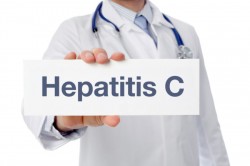Hepatitis C Treatment Options
Hepatitis C is a virus that attacks the liver and is commonly seen among IV drug users. Spread by blood-borne pathogens, Hepatitis C is contracted through sharing needles, injecting equipment, and unprotected sex. If you’re addicted and looking for help, call 800-678-5931(Who Answers?) now to talk to someone immediately.
A decade ago, being diagnosed with Hep C, while not a death sentence, it gave you a gloomy forecast. There were no real treatment options, and other medications and drugs posed the risk of significant damage to your liver.
But that all changed with Interferon.
The First Real Treatment Option

New, more effective anti-viral medications are now available to treat Hepatitis C.
The first option in Hepatitis C treatment was Pegylated Interferon and ribavirin. The treatment course is rough, includes injections and pills, and can have a ton of unwanted side effects, including mental health issues, extreme nausea, and suicidal thoughts. The treatment regimen is six months to a year long and averages a 50 percent success rate.
The Standards Improve
In 2015, new drug combinations were released to treat Hep C. Options now include Sovaldi and ribavirin, or Peginterferon with Incivek, Olysio, Sovaldi, or Victrelis. These treatments are only three months long and have been an 80 and 95 percent success rate.
While that sounds great for those suffering from Hepatitis C, there’s a catch. These new anti-viral drugs are outrageously expensive. In the US, prices range from between $80,000 to $120,000, a price that few IV drug addicts can afford. And while some insurance companies will pay for partial treatment, there’s more than just holes that need to be jumped through.
Because of the hefty price tag, most insurance companies won’t preauthorize the treatment unless the patient has an advanced stage liver disease such as advanced fibrosis or cirrhosis.
To make it even more frustrating, these same medications that cost as much as home in the United States have generics available in other countries that range from $200 to $900, a much more manageable cost.
Who’s a Candidate for Hep C Treatment?
Just because you’re diagnosed with Hepatitis C does not necessarily mean that anti-viral treatment is the right option for you. Because of the nature of Hepatitis C, the negative side effects of the medications, and the high cost of treatment, not everyone is an appropriate candidate.
Here are some of the qualifications needed to be considered for Hep C treatment.
- Compliance to treatment regimen. If you’re not going to take the medication as prescribed, get the testing done, and follow up with the doctors, there’s no use attempting the treatment.
- High risk patients. These include those with HIV, decompensate cirrhosis, or renal impairment. Those who develop recurrent HCV infection after a liver transplant also fit into this group.
- Successful completion of drug and alcohol treatment. If you’re still in the depths of your addiction, it’s not the time to start Hep C treatment. Not only is it too hard on your body, but chances are you’re partaking in risk behaviors, including sharing needs and injecting equipment.
- Age. Because Hep C can be slow moving, those above a certain age would not reap enough benefits to outweigh the costs of treatment.
Do You Have Hepatitis C?
Do have Hep C? Are you still using? Call 800-678-5931(Who Answers?) today to talk someone and get the immediate help you need to get clean and sober. It may just save your life.